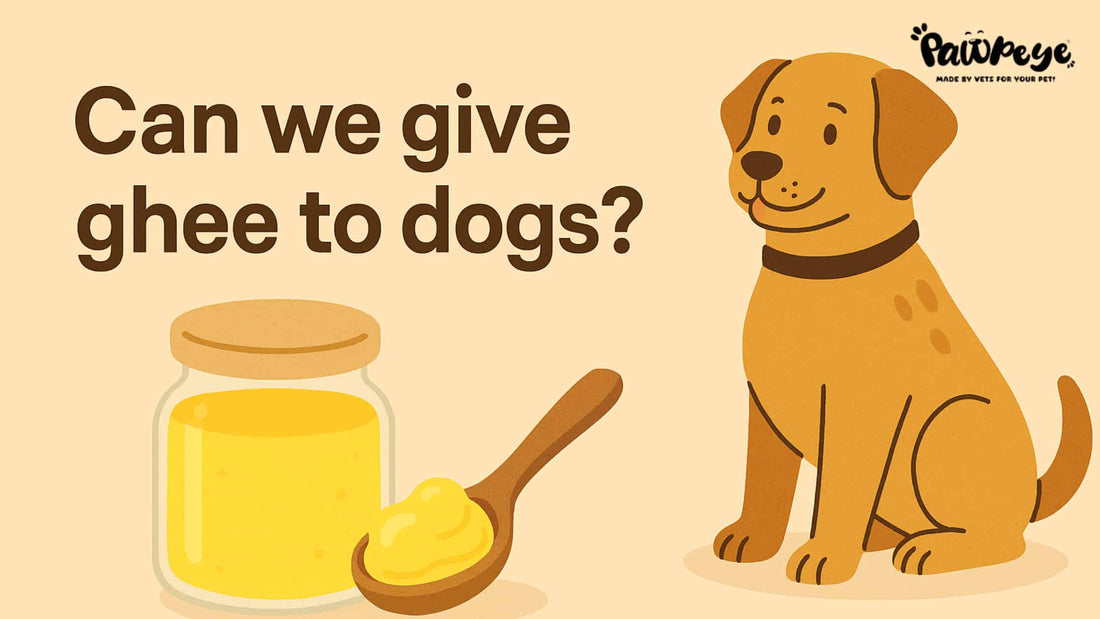
Can we give ghee to dogs?
Share
As you consider adding ghee to your dog's diet, you may wonder about its safety. Giving your dog ghee can have both positive and negative effects. On the one hand, ghee contains healthy fats that may benefit your dog's coat and digestion. On the other hand, overconsumption can lead to pancreatitis, a serious condition. You should consult your veterinarian before making any changes to your dog's diet to ensure their safety and well-being, and to discuss the potential allergic reactions that may occur.

Key Takeaways:
- Feeding ghee to dogs should be done in moderation, as it is high in fat and can cause digestive issues if consumed excessively.
- Dogs can benefit from the nutritional value of ghee, including its rich content of fatty acids and vitamins, which can support their skin and coat health.
- Before adding ghee to a dog's diet, it is important to consult with a veterinarian to determine the appropriate amount and ensure it does not interfere with their dietary needs or cause any allergic reactions.
Benefits of Ghee for Dogs
Nutritional Value
On the topic of ghee's nutritional value, you'll find that it is high in fat, which can be beneficial for your dog's skin and coat health. Help your dog stay cool and refreshed during the summer with hydrating snacks and practical tips. Discover how to keep your furry friend comfortable in the heat
Health Benefits
Benefits of ghee for your dog's health are numerous, including improved digestion and reduced inflammation.
To further understand the health benefits of ghee for your dog, you should know that it contains conjugated linoleic acid (CLA), which can boost your dog's immune system. As you consider adding ghee to your dog's diet, be aware that excessive consumption can lead to weight gain and pancreatitis, so moderation is key. You can consult with your veterinarian to determine the best dosage for your dog, and monitor their health closely to avoid any adverse effects.
Risks and Precautions
One of the primary concerns when giving ghee to dogs is the potential for adverse reactions. As responsible pet owners, you must be aware of the risks involved and take necessary precautions to ensure your dog's safety and well-being.
Allergic Reactions
Betwixt the benefits of ghee, you should be cautious of allergic reactions that can occur in your dog, such as itching, skin irritation, and hives.
Digestive Issues
Behind the potential benefits of ghee lies the risk of digestive issues, including diarrhea and vomiting, which can be uncomfortable for your dog.
Further, if your dog experiences severe digestive issues, it may lead to dehydration and electrolyte imbalances, which can be life-threatening if not addressed promptly. You should always consult with your veterinarian before giving ghee to your dog, especially if it has a history of food allergies or sensitive stomach.

Feeding Guidelines
Keep in mind that when introducing ghee to your dog's diet, it's important to follow guidelines to ensure their health and safety. You should consult with your veterinarian to determine the best approach for your dog.
Quantity and Frequency
Before giving ghee to your dog, consider the quantity and frequency of feeding, as excessive consumption can lead to obesity and digestive issues. You will need to balance the amount of ghee with your dog's regular diet. Rice can be a healthy addition to your dog's diet when prepared correctly.
Mixing with Other Foods
To incorporate ghee into your dog's meals, start by mixing it with their regular food, taking care not to overdo it, as this can cause stomach upset. You can mix ghee with foods like rice, vegetables, or meat.
The key to successfully mixing ghee with other foods is to introduce it gradually and monitor your dog's reaction. If you notice any adverse effects, such as diarrhea or vomiting, you should stop feeding ghee immediately and consult with your veterinarian. By doing so, you can help ensure a healthy and happy dog.
Types of Ghee for Dogs
All dog owners should consider the type of ghee they give to their pets. You can choose from:
- Grass-Fed Ghee
- Organic Ghee
Type of Ghee Description Grass-Fed Ghee Nutritious and healthy Organic Ghee Chemical-free and safe Conventional Ghee Plant-Based Ghee Vegan alternative Raw Ghee Unpasteurized and potent Grass-Fed Ghee
Along with the benefits of ghee, grass-fed ghee is a popular choice for your dog's diet, as it is rich in omega-3 fatty acids.
Organic Ghee
Beside the health benefits, organic ghee is a great option for your dog, as it is free from harmful chemicals and additives.
Consequently, when you choose organic ghee for your dog, you can be sure that you are giving them a healthy and natural product, which can have a positive impact on their overall well-being, and it is necessary to always check the label to ensure that the product is genuine and safe for your pet.

Alternatives to Ghee
Once again, you may be wondering what to give your dog if ghee is not an option. There are several alternatives that can provide similar benefits to your dog's health. You can consider other healthy fats that are safe for canine consumption.
Coconut Oil
Beneath the surface of ghee alternatives, coconut oil emerges as a popular choice. You can add a small amount of coconut oil to your dog's food, but be aware of the potential for digestive issues if given in excess.
Fish Oil
Any dog owner looking for a ghee alternative may consider fish oil, which is rich in omega-3 fatty acids. You can give your dog fish oil supplements, but always choose a high-quality product to avoid mercury contamination.
To provide your dog with the benefits of fish oil, you should select a product that is specifically formulated for canine consumption. When giving your dog fish oil, you'll notice improved skin and coat health, as well as reduced inflammation. However, be cautious not to over-supplement, as this can lead to negative side effects, such as digestive problems or allergic reactions. Always consult with your veterinarian before adding any new supplement to your dog's diet.
Monitoring and Adjustments
To ensure your dog's health and safety, you should monitor their behavior and adjust their diet accordingly.
Watching for Signs of Discomfort
Across the board, it's crucial to observe your dog's behavior and watch for signs of discomfort, such as vomiting or diarrhea, after introducing ghee into their diet.
Adjusting the Diet
Discomfort in your dog can be a sign that their diet needs to be adjusted. You should reduce the amount of ghee or switch to a different food if you notice any adverse reactions.
At this point, you may need to reassess your dog's diet and consider consulting a veterinarian for personalized advice on adjusting their diet. Your dog's health is paramount, and making informed decisions will help ensure their well-being and happiness. Be sure to introduce changes gradually to prevent any sudden upset and always prioritize your dog's health and safety.
Conclusion
With these considerations, you can now decide whether to add ghee to your dog's diet. You should introduce it in small amounts, observing your dog's reaction and adjusting accordingly. Your dog's health and well-being depend on a balanced diet, and ghee can be a valuable addition when used thoughtfully. By being mindful of the potential benefits and risks, you can make an informed decision about giving ghee to your dog.
Frequently Asked Questions
Is it safe to give ghee to dogs?
A: Yes, ghee can be safely given to dogs in moderation. Ghee, which is clarified butter, contains healthy fats that can be beneficial for a dog's coat, skin, and digestive system. However, it's necessary to introduce ghee into a dog's diet gradually and in small amounts to prevent any potential digestive issues.
What are the benefits of giving ghee to dogs?
A: Ghee has several benefits for dogs. It is rich in conjugated linoleic acid (CLA), which can help improve a dog's immune system and reduce inflammation. Ghee also contains fat-soluble vitamins like vitamins A, D, E, and K, which are necessary for a dog's overall health. Additionally, ghee can help improve a dog's coat and skin health, making it shiny and healthy.
How much ghee can I give to my dog?
A: The amount of ghee to give to a dog depends on its size, age, and individual needs. As a general guideline, you can start with a small amount, such as 1/4 teaspoon per 10 pounds of body weight, and gradually increase it as needed. However, it's always best to consult with a veterinarian before making any changes to your dog's diet.
Can puppies have ghee?
A: Puppies can have ghee, but it's necessary to introduce it slowly and in small amounts. Puppies have sensitive digestive systems, and sudden changes to their diet can cause digestive issues. It's best to start with a small amount, such as 1/8 teaspoon per 10 pounds of body weight, and monitor the puppy's reaction before increasing the amount.
Are there any potential risks of giving ghee to dogs?
A: While ghee can be beneficial for dogs, there are potential risks to consider. Dogs with dairy allergies or sensitivities may react to ghee, and it can also cause digestive issues in some dogs. Additionally, ghee is high in fat, so it can contribute to weight gain if given in excess. It's necessary to monitor your dog's reaction to ghee and adjust the amount accordingly to prevent any potential health issues.
